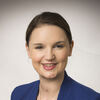
Katherine Ingham
- PhD title: SCITT trainee teachers' choice of ITT pathway - implications for marketing and recruitment (EdD)
- Year of graduation: 2019
- Nationality: British
Please tell us a bit about yourself and your background (including previous study)
I work full-time at the University of Leeds in the Business Change team. I started my career as a Secondary Mathematics Teacher through Teach First. I have a Masters in Geographical Sciences (Bristol), a Masters in Education (Manchester) and PGCE in Mathematics (Sheffield Hallam).
What motivated you to undertake an EdD and why did you choose the University of Leeds?
When I began working at the University of Leeds, I was employed as the Teacher Education Partnership Manager, and a large part of my role was marketing our Initial Teacher Training (ITT) Programmes and recruiting trainees. I was therefore interested in studying the impact of current ITT policy reforms on trainee recruitment. As the University was my employer, it made sense to study here as well.
Please tell us about your research topic and what makes you passionate about this area of study.
The EdD is styled as a “Professional Doctorate” which allows you the flexibility to marry your professional interests with further academic study in a related field. I was interested in the topic of teacher recruitment because it was directly related to my job role at the time, and even though I have since moved away from that subject professionally, I still retained a keen interest in the topic and found my studies a welcome break from the daily grind of the day-job. The academic theory that I drew upon for my thesis is applicable to other areas of recruitment and marketing, especially in the field of Higher Education, so I still found this very energising. If anything, changing roles throughout my thesis helped me sharpen my focus.
How would you describe the research environment and community in the school and in the university generally? Are you involved in research centres and/or do you work with other academics and postgraduate researchers whether inside the school or across the university?
Whilst working full-time, I have always struggled to feel part of the same PGR community who might otherwise sit and work together in the School of Education full-time. However, the tutors are great at facilitating lunch events to share research topics and general interests, and I have always made a point of taking part in the yearly calendar of Research Conferences in the School, Faculty and across the White Rose Partnership. Through this, you begin to see familiar faces and make good contacts, even if you only see your network occasionally face-to-face. My Supervisors have been great at highlighting various opportunities as well.
What would you say about the learning, training and research facilities in the School and at the University?
I have made great use of the specially-designed Postgraduate Researcher space in the Edward Boyle library throughout my 4 years on my project. It has been immensely useful to be able to book a single study space to get away from my usual desk and focus on my studies. The library also provides great courses to support Researchers. I’ve attended sessions on how to use NVIVO software, how to publish work from your thesis, and I’ve attended the “Shut up and write” sessions where you have three hours of structured writing to help you if you’re a chronic procrastinator like me. It was great to do this alongside not just students but other members of staff who wanted the space to switch off and write in a structured environment using the Pomodoro Technique. This equally adds to the sense of an academic community at Leeds.
Do you take part in any activities outside of your study? (eg. clubs and societies at the union or perhaps activities in the School).
I haven’t taken part in any activities in the School due to my other work commitments. However, I have made use of the excellent fitness facilities at the Edge.
What are your plans once you have completed your EdD?
I don’t intend to move into academic study but I do plan to continue in my professional role in Higher Education, and having the knowledge and insight of completing a Doctorate helps me to appreciate the context in which we all operate.
What do you think of Leeds as a city?
I love Leeds as a city, and I’d say it’s almost on a par with Bristol where I studied for my undergraduate degree. There’s so much going on but it doesn’t feel too big and overwhelming. I grew up in the rural South West of England so I’m just glad to be around people and things going on – plus it’s not far to visit friends in Manchester or Sheffield.
What would you say to someone considering a research degree in the School?
Try to have as clear as possible a view of the topic that you intend to study, and make sure this aligns to one of the research areas in the school. Also, take whatever expectations you have around the length of time and effort that a research degree might require, and add at least 50% more. It’s a big commitment and you need a lot of tenacity. However, I have no doubt that Leeds is one of the best places to see it through if you decide to embark upon a research degree.
Are there any other highlights of your EdD experience so far that you would like to tell us about (eg. Any awards, conferences, publishing achievements or social events)?
I passed my Viva Examination in June 2019 so am just finishing up on minor corrections before submitting the final thesis. I’m hoping to graduate in December 2019 and it still hasn’t quite sunk in yet!

